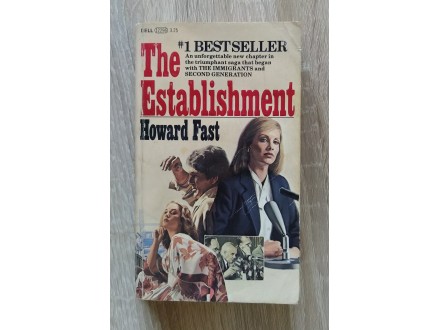Ponuda "Howard Fast The Naked God 1st edition" je arhivirana
Howard Fast - The Naked God (1st edition)
2.490 din.
DRUGA GENERACIJA - Howard Fast
200 din.
THE ESTABLIMENT Howard Fast
359 din.
Howard Fast - The Establishment
299 din.
Howard Fast - Second Generation
299 din.
HOWARD FAST - DRUGA GENERACIJA I-II
485 din. 437 din.
Howard Fast - DRUGA GENERACIJA I
120 din.
HOWARD FAST - DRUGA GENERACIJA 1-2
238 din. 214 din.
Howard Fast DRUGA GENERACIJA
190 din.
DRUGA GENERACIJA 1-2 Howard Fast
275 din.
Druga generacija 1-2 - Howard Fast
550 din.
THE PROUD AND THE FREE Howard Fast
300 din.
Druga generacija I, Howard Fast
250 din. 213 din.
Doseljenici 1 - Howard Fast
200 din.
Howard Fast - Doseljenici II
120 din.
DOSELJENICI 1-2 - HOWARD FAST
600 din. 540 din.
Howard Fast - The Naked God (1st edition)
2.490 din.
DRUGA GENERACIJA - Howard Fast
200 din.
THE ESTABLIMENT Howard Fast
359 din.
Howard Fast - The Establishment
299 din.
Howard Fast - Second Generation
299 din.
Howard Fast Les batisseurs
499 din.
HOWARD FAST - DRUGA GENERACIJA I-II
485 din. 437 din.
Howard Fast - DRUGA GENERACIJA I
120 din.
HOWARD FAST - DRUGA GENERACIJA 1-2
238 din. 214 din.
Howard Fast DRUGA GENERACIJA
190 din.
DRUGA GENERACIJA 1-2 Howard Fast
275 din.
Druga generacija 1-2 - Howard Fast
550 din.
THE PROUD AND THE FREE Howard Fast
300 din.
Druga generacija I, Howard Fast
250 din. 213 din.
Doseljenici 1 - Howard Fast
200 din.
Howard Fast - Doseljenici II
120 din.
DOSELJENICI 1-2 - HOWARD FAST
600 din. 540 din.























